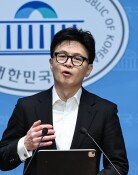Mid-term Elections to Change US Political Landscape
Mid-term Elections to Change US Political Landscape
Posted November. 03, 2010 11:19,
The U.S. mid-term elections Tuesday is expected to change the political landscape in Washington, with the Republican Party likely to gain a majority in the House of Representatives.
The Republicans, who are predicted to recover much of their power lost to the Democrats in 2006, will likely have significant influence over U.S. President Obamas management of state affairs.
A new Republican leadership will likely review key issues involving South Korea, including Seoul`s relationship with Washington, the bilateral free trade agreement, and North Korea.
○ Brighter prospects for FTA ratification
The shift in power in the House of Representatives is important because of the unique power of Congress. The House has the power to propose the governments revenue and spending and impeach the president, so it could determine the fate of the trade deal.
In particular, the powers of the House speaker and chairmen of congressional standing committees are crucial. Unlike South Korea, the majority party in Congress monopolizes the chairmanship of standing committees.
Seoul will closely watch the fate of Democrat Sander Levin, the chairman of the House Ways and Means Committee who is a staunch opponent of the free trade agreement. Though expected to win his 14th term as a Michigan congressman, he will have to hand over the chairmanship to fellow Michigan legislator Dave Camp, a Republican.
Camp is focusing on the direction of additional discussions on the auto sector, the most disputed area in the trade deal, but prospects for House approval of the accord are expected to rise.
House Minority Leader John Boehner of Ohio, who will likely become the House speaker if his party wins a congressional majority, and House Minority Whip Eric Cantor of Virginia are also supporters of free trade and favor the trade deal signed by the Bush administration.
○ Bilateral alliance and North Korea
Considering the Republicans foreign policy line of attaching importance to alliances, ties with Seoul will likely remain rock solid. Under the Democratic-ruled Congress, the Republican Party has cooperated in strengthening ties with South Korea.
The Houses stance toward North Korea will likely grow tougher. Cuba-born Republican congresswoman Ileana Ros-Lehtinen of Florida, who is expected to chair the House Foreign Relations Committee, has great interest in the Norths human rights situation and is a strong opponent of Pyongyangs nuclear development.
After the U.N. Security Council issued a chairmans statement on the Norths sinking of a South Korean naval ship in March, she sought to re-designate the North as a state sponsor of terrorism.
A congressional source in Washington said that if the Republicans control the House, the proposal for putting back the North on the terrorism blacklist will likely emerge again.
Republican Ed Royce of California will likely chair the House Subcommittee on Terrorism, Nonproliferation and Trade.
triplets@donga.com



![[단독]김경 “1억원 줄때, 강선우도 함께 있었다” 자수서](https://dimg.donga.com/c/138/175/90/1/wps/NEWS/IMAGE/2026/01/14/133148772.5.jpg)



